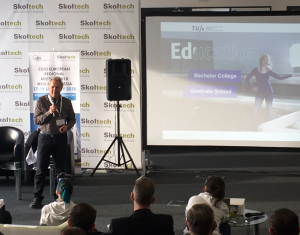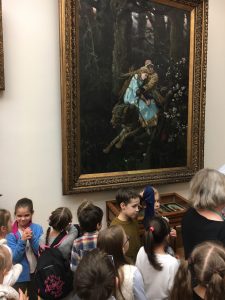By Jan van der Veen, University of Twente
Visiting Moscow in the wintertime (17-20 January 2018) is special: few tourists, a snow covered city and a very warm welcome. The CDIO community of Technical Universities applying project based learning met at Skoltech University. This newly established English language university has started a couple of years ago with masters and PhD programmes. The main building is still under construction but was open for us. Some architects of the Beijing Olympic Stadium were hired and together with the founding team a special building was created. A rare occasion when you can align your educational design with the building and learning spaces from scratch! The building is huge, walking around the circular building will make a nice exercise of 880 meters.

Developing economies
Within this circle there are smaller units for separate research and education settings while offering many opportunities to meet and collaborate. Students are engaged in these settings from the start. The founding team was composed of both Russian engineers as well as engineering education specialists from around the world. One of the Skoltech inspirators was Edward Crawley (MIT) who delivered a keynote on how research and education can feed into innovation processes. Next to the university the first spin-offs are set up and more to come. This reminds us that technical universities are supposed to play a role in the development of our economies. The keynote and discussion covered how the educational programme could play a role in this regard via entrepreneurial skills, creativity, risk taking and making interdisciplinary connections.

TU Eindhoven presentation
New CDIO members presented themselves. TU Eindhoven was introduced by Lex Lemmens. His presentation showed that Eindhoven is eager to have innovation as a focal point, well connected with small and larger companies in the Eindhoven region.
University career frameworks

Tretyakov Gallery
Together with Birgit Pepin(TU Eindhoven) and Clement Fortin(Skoltech) 4TU.CEE ran a workshop on university career frameworks that balance teaching and research achievements. This relates to international efforts coordinated by the Royal Academy of Engineering project supervised by Ruth Graham. In many universities both management and staff wish this balance to be enforced but few see how this can be achieved. After three introductory case studies participants formulated their recommendations group-wise. Clearly not only a framework and measuring tools are required but also a culture shift. Parallel to this career approach a professional development programme beyond basic teacher training workshops is needed, see for example the pilot at the University of Twente. Aiming at scholarship of teaching and learning fits naturally in an academic context, connecting nicely to what 4TU.CEE stands for. Besides an inspiring engineering education meeting there was some time left to visit a few Moscow highlights. The Tretyakov Gallery is definitely on my shortlist with many paintings from Repin and other great Russian painters.




